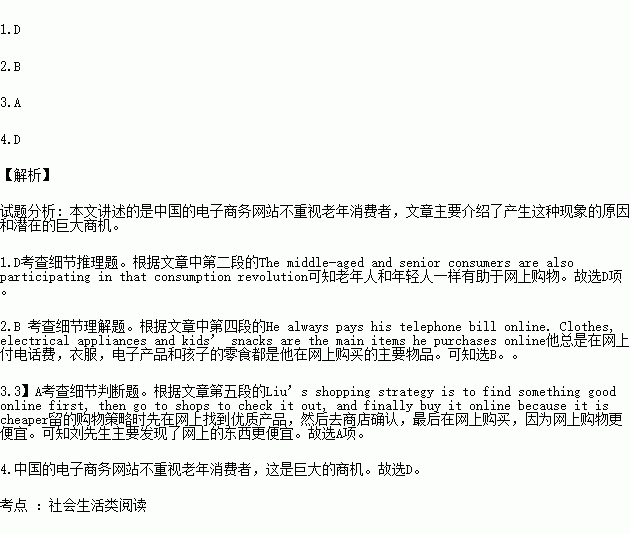题目内容
Chinese e-commerce websites fail to pay more attention to older consumers, says a news report.
There’s been a thought that younger consumers have been the driving force of online buying. That may not be the case. According to a statement from Alipay, the average expenditure (支出) of Alipay users born before the 1960s was 31,000 yuan in 2012, much higher than 14,000 yuan of those born after the 1980s. It shows that online shopping has become a key part of people’s daily consumption, for both young and old.
Besides shopping, people pay bills such as water bill, electricity bill, and credit card repayment online. The middle-aged and senior consumers are also participating in that consumption revolution.
Liu Chen, 56, said that his online expenditure in 2014 was over 50,000 yuan, about half of the total annual expenditure. He always pays his telephone bill online. Clothes, electrical appliances and kids’ snacks are the main items he purchases online.
Liu’s shopping strategy is to find something good online first, then go to shops to check it out, and finally buy it online because it is cheaper. As quality concerns him, Liu only buys items that come with a guarantee.
Stories such as those from Liu are representative of millions of middle-aged and older Chinese, which show the great potential of the aged in the Chinese consumption market. Yet, the market seems not to be valued as it should be.
Some Chinese e-commerce websites such as jd. com, dangdang. com and amazon. cn don’t have a category for goods for the elderly on their main pages. Alibaba’s platform does have one, but the goods in it are not as abundant as other categories. Moreover, Taobao’s category is not really designed for elders, but their children.
Despite the seeming lack of commitment to older consumers, the Chinese market for the elderly is clearly huge, and e-commerce websites should take great efforts to develop it.
1.The data in Paragraph 2 is used to prove that ________.
A. young people have learned to save money
B. older people are crazy about online shopping
C. young people are the driving force of online shopping
D. both the young and the old have contributed to online shopping
2.According to the passage, Liu Chen mainly spends money online on _______.
a. buying clothes
b. paying the telephone bill
c. paying the electricity bill
d. buying electrical appliances
A. a, b, c B. a, b, d C. b, c, d D. a, c, d
3. Liu Chen chooses online shopping mainly because of its ________.
A. low price B. convenience
C. great potential D. quality guarantee
4.Which is the best title of the passage?
A. Online shopping
B. Older consumers in e-commerce
C. Chinese e-commerce
D. Huge e-commerce market for the elderly


